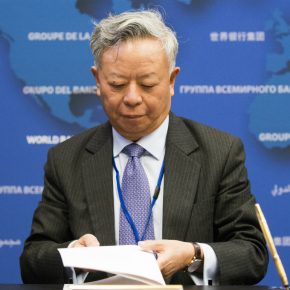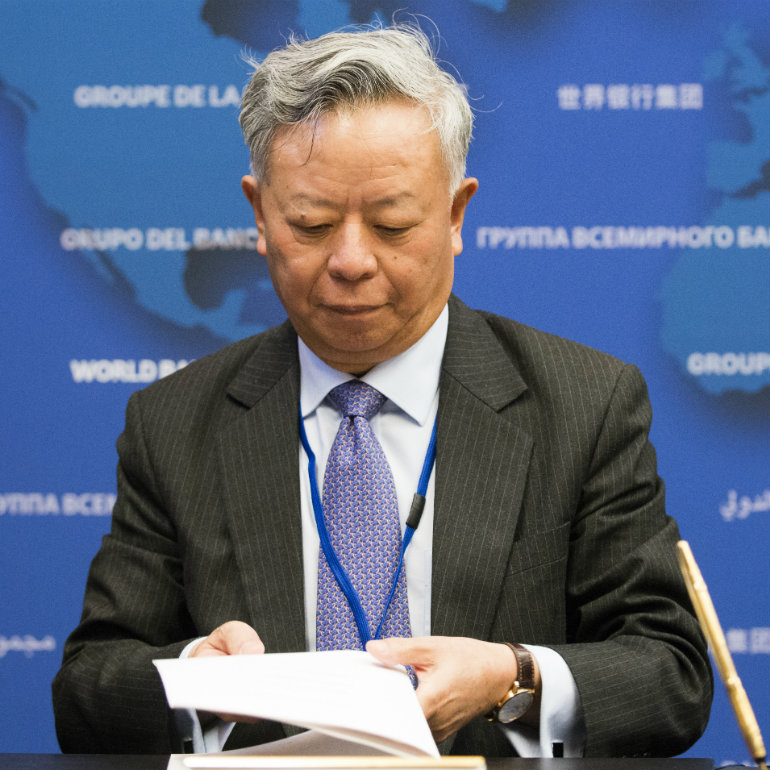Tydzień w gospodarce
Category: Raporty

Jin Liqun, President of Asian Infrastructure Investment Bank (World Bank, CC BY-NC-ND)
Polish MPs were in no doubt that President Andrej Duda should ratify the agreement on the establishment of the Asian Infrastructure Investment Bank (AIIB). The Sejm voted unanimously – which is a rare occurrence these days – in support of Poland’s accession to the Chinese alternative to the International Monetary Fund and the World Bank.
“Poland sees similarities between the AIIB and the European Bank for Reconstruction and Development or the European Investment Bank,” it was said during the parliamentary debate on the ratification of the agreement.
Poland is among the 57 founding members of the bank, with a share of USD831.8m. This translates into 0.83 per cent of the institution’s capital, ranking Poland 21st in this respect and granting it slightly less than 1 per cent of the vote. In terms of pure cash, the Polish contribution will amount to USD166.4m and will be paid to the Bank’s treasury in five instalments disbursed through the end of 2017. The remaining part of the contribution is capital paid on request. The Ministry of Finance said that funds for this purpose have been earmarked in the budget.
Each member of the AIBB is entitled to a place on the Board of Governors. The Minister of Finance will represent Poland. Jin Liqun of China will head the AIBB. Once negotiations on establishing the Bank had proved successful, Jin was hailed as a national hero, and the economic media mentioned him as a candidate for the title of the “Man of the Year”. This shows how important the AIIB’s creation was for China. There are also Europeans in the Bank’s top management. Daniel Alexander of the U.K., a close associate of Prime Minister David Cameron, and German banker Joachim von Amsberg, formerly vice president of the World Bank, were both appointed as AIIB vice presidents. Representatives from India, South Korea and Indonesia are the remaining vice presidents.
Poland was quietly hoping that it would get one of the 12 seats on the board of directors, the Bank’s executive body. This didn’t happen, supposedly due to Polish hesitation on whether to join the Chinese initiative, especially in the early stages of the AIIB’s creation (China announced the idea two years ago). Poland declared its accession in March 2015, which apparently mattered to the Chinese, who pay a lot of attention to such nuances. However, Deputy Finance Minister Leszek Skiba said Poland managed to, “negotiate that a representative of Poland would serve as a director for two years starting from 2022 and that he would be appointed as a deputy director before that.”
By December 25th, 17 countries whose total number of shares exceeded 50 per cent had ratified the agreement creating the AIIB. This formally established the bank. Countries which had submitted documents by then were Austria, Australia, the Netherlands, Luxembourg, Germany, Norway, the United Kingdom, Brunei, Georgia, Jordan, South Korea, Burma, Mongolia, New Zealand, Pakistan, Singapore and China. Further countries joined after that date: Russia, the Maldives, Denmark, Finland, India, Indonesia, Israel, Malta, Nepal, Laos, Tajikistan, Turkey and the United Arab Emirates. Remaining countries have until the end of 2016 to ratify the agreement. Although all the major EU countries have joined the AIIB, Poland is the only country from Central and Eastern Europe to take part.
China has contributed about USD30bn the AIIB (26.05 per cent of its capital) and will hold 30.34 per cent of the shares. The other large shareholders are India (7.5 per cent) and Russia (5.9 per cent). The total share capital of the bank will amount to USD100bn. China’s share gives it veto power over bank decisions.
The bank’s initial capital is not much, however, when set against the scale of its ambitions. Plans call for USD 8 trillion is to be invested in programs financed by the AIIB, mainly focusing on infrastructure in Asia. Poland hopes that some of this spending will also benefit Polish companies.
Although Beijing said that the establishment of the AIIB was guided purely by economic objectives and the goal of “providing an impulse to the growth of structural investments in the Asia-Pacific region” which would also guarantee a share of the growing investment market in this part of the globe to other countries, the fact that powers such as Germany, the United Kingdom and France (Japan did not join the Bank) have supported this idea is see as a defeat for the United States, which tried to discourage its allies from joining the AIIB. The success of Chinese diplomacy is also proof of a weakening of confidence in the dollar and a willingness to risk good relations with the U.S. in the name of economic benefits.
Western experts point out that the AIIB’s creation is a big step towards the internationalization of the yuan and making it a global currency. It is also a way for China to avoid their own mounting economic problems and a weakening of growth in their country. In return, the Americans had no choice other than invite China into the Trans-Pacific Partnership (TPP).
In an interview with the Xinhua agency, the president of the AIIB said that the first funds from the bank would be disbursed this year. They will be allocated for energy, transportation, telecommunications, logistics and environmental protection projects.
It is still an open question to what extent Poland will take advantage of the development opportunities provided by the AIIB There was a view that Poland’s accession to the AIIB should depend on the contracts it could obtain. The Chinese haven’t promised anything yet. Poland particularly hopes to improve its trade balance with China, which has been negative for many years (Poland exports about EUR 2 billion to China and imports about EUR 19 billion). Involvement in the AIIB is supposed to ease the access of Polish companies to infrastructure projects to get first-hand information on investments the AIIB wants to support. Poland also hopes to make it easier for Polish companies to access Asian markets.
For Poland, joining the AIIB is also an investment in the future, because European Union cohesion funds will at some point run out. Being a member of a financial institution with global impact should help Poland influence the bank’s activity, and could highlight projects Poland cares about.
The financial guarantees provided by the AIIB, which should translate into improved security for the activities of Polish companies on the Asian markets, are also important. Besides China, the AIIB will also operate in Central Asia and the Caucasus, where Polish companies are already present.
Poland could also use its membership in the AIIB to develop an entirely new strategy for eastern markets, and particularly China. Until recently, few believed that China would be able to so quickly establish a completely new financial institution of international importance, and that Poland would be a member.
The AIIB has ambitious plans. The bank’s creation is widely discussed in China, where it is treated as a prestigious success in the face of the recent economic troubles like the slump on the local stock market, growing internal debt, capital flight, dwindling foreign exchange reserves and generally pessimistic macroeconomic data.
For the time being, however, the AIIB is still far from being a real counterweight to the IMF or the World Bank. Beijing does not hide that it is planning, as always, for the long-term. It is said that the AIIB is ultimately expected to cross the boundaries of Asia and – at some point – enter Europe.


